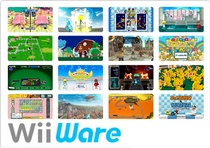Small Games Make Big WavesSmall Games Make Big Waves
The game industry is doing “okay” in this bad economic time compared to other industries. Primarily, Nintendo is rocking the house with their games, hand-held’s and consoles while mobile developers are showing some great successes in the industry. Many success stories in our industry are based on small titles, downloadable games of the more “casual” style while a few larger titles are experiencing slower than expected sales trends.
 We’ve mentioned this in the past, but the tough economy gives many smaller developers great opportunities for success. While big publishers struggle to look good in the eyes of the investor, tiny developers can produce quality titles for minimal cash investment and time to market. Ten years ago, smaller developers tried to compete with the big boys making larger titles, cloning successful titles or simply asking investors to put it on the line for their game. Today, developers can create a small iphone app, a cute WiiWare title or exploit the XNA efforts of Microsoft for Xbox Live Arcade and actually have a chance.
We’ve mentioned this in the past, but the tough economy gives many smaller developers great opportunities for success. While big publishers struggle to look good in the eyes of the investor, tiny developers can produce quality titles for minimal cash investment and time to market. Ten years ago, smaller developers tried to compete with the big boys making larger titles, cloning successful titles or simply asking investors to put it on the line for their game. Today, developers can create a small iphone app, a cute WiiWare title or exploit the XNA efforts of Microsoft for Xbox Live Arcade and actually have a chance.
There are still challenges with these smaller developers when working in the WiiWare and XBLA publishing channels, your game marketing and promotion becomes highly reliant on Nintendo, Microsoft or Sony for PSN. Tom Prata, senior director of Nintendo of America talked to Gamespot about this issue:
“Finally, there’s the problem of promotion. It’s not enough to make a great game if nobody notices it. Prata specifically said Nintendo will be devoting more resources to support the promotion and development of WiiWare games in the future.” (gamespot)
Of course, in the world of smaller game titles and downloadable casual games, you’re going to be at risk of finding a lot of “shovelware” — products that are only released to make a quick dime, often based on some license or popular theme/character. The great game titles will, hopefully, rise to the top and show themselves off amongst all the wanna-be money makers.
Those smaller developers putting a huge passion into their titles actually have a chance in this new industry trend. Game makers, internationally, now have a chance to grasp a small piece of the industry and make their dreams come true. The core audience may see this as a trend of noisly low quality titles, but I believe the industry needs this change to grow a new generation of developers based on niche interests.
While many can wait for their next release of Madden the rest of us will continue to spend a little money to see what the future innovators are going to be bringing to the table.

 This is not the fault of GameStop and their 48% profit margins because they’re only getting 7% to 20% profit margins (
This is not the fault of GameStop and their 48% profit margins because they’re only getting 7% to 20% profit margins ( Many game studios are being dropped following a bit of an economic downturn in the United States and globally. Activision has to
Many game studios are being dropped following a bit of an economic downturn in the United States and globally. Activision has to  Gamers around the world are going to feel the pain in the 2009 holiday season after the economy shakes apart many great development studios. Electronic Arts feels the pain of being a public company as their investors complain about lackluster revenue, THQ deals with closing studios to extend their runway and other firms will lose more headcount in the coming months.
Gamers around the world are going to feel the pain in the 2009 holiday season after the economy shakes apart many great development studios. Electronic Arts feels the pain of being a public company as their investors complain about lackluster revenue, THQ deals with closing studios to extend their runway and other firms will lose more headcount in the coming months.